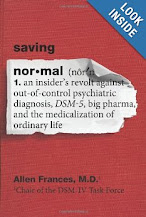Good mental health reporting takes research, careful analysis, nuance and a whole lot of work. And in the end, it doesn't sell newspapers. Which is why you see so much bad mental health reporting, even where you thought you'd find better.
[I like to think that opening sentence explains why I post no more often than once a week. I work to provide a quality product. But that is for you to judge.]
The long awaited publication of the Diagnostic and Statistical Manual, Edition V has generated a blizzard of easy-to-whip-off articles with sensationalist headlines, just the thing for you to share on Facebook on a boring weekday afternoon, and get a nice
Ain't it awful rant going among your friends when, really, you should be doing your life.
The Spectre of the Butterfly Net

Most of these articles follow the same tired theme,
Psychiatrists are out to diagnose half the population, turning normal human conditions into mental illnesses, because they are in cahoots with the pharmaceutical industry to put the nation on medication.
These articles write themselves. Pick any diagnosis that the DSM-V has dared to update from a work last revised nineteen years ago, add a quote from the disgruntled old man who was editor-in-chief of said nineteen-year-old document, which only barely tinkered with the 1980 edition anyway, plug in a statistic on drug sales, and there you have it.
Next, pick another diagnosis, substitute a humanistic psychologist for the disgruntled old man, and you are good to go with next week's article.
I, who love links, am not going to link to any of this trash.
Now I have my problems with the DSM. But I do have some sympathy for its revisers, caught in the middle of a sea change, trying to update a system that will be tossed into the deep within the decade, and would have been already, if we spent any halfway reasonable amount of money on research.
For now I will do my own op ed piece and offer for your consideration the following assertion, based on my own experience in the system and reports of friends who have been at this a whole lot longer:

There are no psychiatrists running around on the streets, chasing toddlers with temper tantrums, trolling funeral parlors for grieving widows, whipping up business. People! There are not enough psychiatrists to deal with the loonies already identified. They do not need you!
You don't get to see a psychiatrist and submit to trial by DSM until
- denial
- snapping out of it
- hiding
- behavioral modification
- herbal remedies
- and prayer
have not worked, and there is no choice but to go where you do not want to go, in the face of your drinking buddies who all tell you,
You'd have to be crazy to see a psychiatrist.
Well, maybe you are. Maybe you are on the knife's edge. Be prepared to stay there a while longer. It will take three months to get an appointment. Longer, if you don't have insurance.
Seriously, they don't need you.
Diagnosis is Your Best Friend
Do you know anybody who has suffered for years with some unidentified illness, bouncing from doctor to doctor, treatment plan to treatment plan, feeling crazy and out of control, because there is no reasonable explanation for these vague, though debilitating symptoms that come and go, and your friend begins to think that you all think he/she is crazy and not really sick at all? Lyme Disease, Fibromyalgia, TBI, MS, ALS, Lewy Bodys...
The day that person receives a diagnosis, even a difficult one, is a day of rejoicing. Now he/she
knows, can make plans, can learn about the illness, follow a course of treatment, maybe even find one that helps.
Diagnosis, if it is the right diagnosis, even if it is more serious than the previous diagnosis, even if you really, really don't like the diagnosis, is the first step toward recovery.
I mean, think about it. If you get out of breath climbing a flight of stairs, do you listen to your friends tell you to rest mid-flight? Or do you go to a doctor who might tell you that you have a blocked artery? Is the doctor drumming up business? Or is he/she saving your life?
Mental Illnesses are Made of Normal Experiences
Let's break out some dialectical thinking. I know, it's hard. That is why mental health reporters for
USAToday and even the
New York Times don't ask you to do it.
Prozac Monologues does ask you to do it. But we can take it slow.
First, what is
dialectical thinking? It is when you hold two truths that seem to contradict each other in your mind at the same time. Truth is not about
either/or. It is mostly
both/and.
So our first statement is this:
Mental illnesses are made of normal experiences. Everybody gets sad. Everybody gets angry. Everybody gets up in the morning sometimes and just can't get started on the day. Everybody who walks by a group of scary people thinks they are saying bad things. Everybody catches something out of the corner of the eye that isn't really there. Everybody throws something against the wall. Everybody persists in believing something that is false. Everybody has an occasional impulse to jump off the bridge.
The symptom lists of the DSM are filled with behaviors that everybody does.
News Flash: Us loonies inhabit the same planet as everybody else.
That is the first truth in our venture into dialectical thinking. And it is the source of all those headlines about how the DSM is turning normal behavior into mental illness. How is this for a thought -- mental illness really is not that weird after all.
The Suffering of Mental Illnesses is not Normal Suffering
But. Here is the other statement to hold in your mind while remembering the first one:
There is a difference. You get a diagnosis of some sort of mental illness when a whole lot of normal experiences and a whole lot of normal suffering pile up beyond your ability to function in a normal world.
That's it. If you are not at the end of your rope, you do not have a mental illness. Rather you are having a bad day, or week, or year. If you are functioning well in the world, you do not make an appointment with a psychiatrist, and do not receive a diagnosis. And the psychiatrist is just fine with that, because he/she doesn't have time to see you anyway. The DSM is not about you, and does not try to be about you. So leave it alone and let it help those of us who need its help.
When your loved one dies, you will not be diagnosed with depression just because you are going through a normal grieving process. A
normal grieving process looks like depression, but only on the surface.
If what you have is Major Depressive Disorder, then you don't go through a normal grieving process. You don't think about your loved one; you don't remember the good times; you don't share those scandalously funny pokes in the ribs during the funeral; you don't cling to your sister; you don't even get mad at the person who deserted you by dying. You just sit under a black cloud and think about how miserable you are. So you do not get better, and -- get this -- you do not do
normal grieving, until you get treated for your depression.
Grieving widows are in no danger from the DSM, if their grieving really is normal.
When your child throws a temper tantrum, you don't run out for a diagnosis of Disruptive Mood Dysregulation Disorder. A badly behaved child has good days and bad days. If the parents are consulting with school and other resources and genuinely working on the issue, things get better. When they have tried every recommendation in the book, when they fear for their lives, when the child is out of control and scared and miserable about his/her own behavior,
and this has gone on for years...
then it is insulting, it is cruel and it is simply not helpful to tell these parents that there is nothing wrong with their child and that the doctor's attempts to figure it out are part of some grand conspiracy that threatens to medicalize normal behavior. If you don't know, if you have not walked in their shoes, then shut the hell up.
Naughty children are not diagnosed in the DSM, if they can get better without it.
Diagnosis of Mental Illness is Not Easy
The DSM V does not make diagnosis easier. Yeah, well -- diagnosis of any sort got more complicated when they threw over the
four humours theory.
There is more to say in the DSM's defense. I will get to it. It will make me work and make you think. And I don't imagine you will share it on Facebook.
Oh well. My ad revenue never did pay the mortgage.
flair from Facebook.com



























.png)















